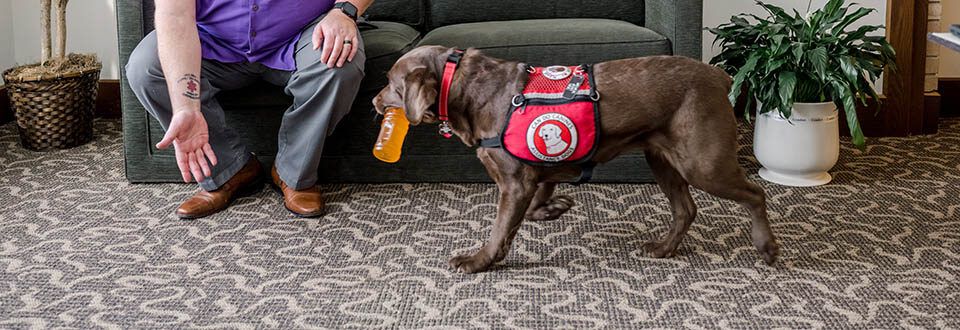
A service animal is a dog, or in some cases a miniature horse, individually trained to do work or perform tasks for someone with a disability. Service animals are different from Emotional Support Animals (ESA) and can go almost anywhere with their owners. MCD works to inform the public about service animals and protect the rights of people with disabilities.
Under the Americans with Disabilities Act (ADA), state and local governments, businesses, and nonprofit organizations that serve the public generally must allow service animals to accompany people with disabilities in all areas of the facility where the public is normally allowed to go. For example, in a hospital it would be inappropriate to exclude a service animal from areas such as patient rooms, clinics, cafeterias, or examination rooms. However, it may be proper to exclude a service animal from operating rooms or burn units where the animal’s presence may compromise a sterile environment.
Definition
As defined in the ADA, a service animal may be a dog, or in some cases a miniature horse, individually trained to do work or perform tasks for an individual with a disability. The task(s) performed by the animal must be directly related to the person’s disability. The ADA allows these animals to go anywhere that the public is allowed to go.
It is important to note that service animals are highly trained over the course of multiple years.
Emotional support, therapy, comfort, or companion animals are not considered service animals under the ADA. These terms are used to describe animals that provide comfort just by being with a person.
IMPORTANT: Because they have not been trained to perform a specific job or task, they do not qualify as service animals under the ADA.
Rights
Staff/businesses cannot ask about the person’s disability, require medical documentation, require a special identification card or training documentation for the dog, or ask that the dog demonstrate its ability to perform the work or task. Service animals do not have to wear a vest or patch or special harness identifying them as service animal.
Two questions may be asked of the owner of a service animal:
- Is the service animal required because of a disability?
- What work or task has the animal been trained to perform?
Service animal users must be afforded the same opportunity as any other guest in any establishment. People with disabilities who use service animals cannot be isolated from other patrons, treated less favorably than other patrons, or charged fees that are not charged to other patrons without animals. In addition, if a business requires a deposit or fee to be paid by patrons with pets, it must waive the charge for service animals.
Allergies and fear of dogs are not valid reasons for denying access or refusing service to people using service animals.
Service dogs may be any breed. Local breed bans do not apply to service dogs.
Responsibilities
Under the ADA, service animals must be harnessed, leashed, or tethered, unless these devices interfere with the service animal’s work or the individual’s disability prevents using these devices. In that case, the individual must maintain control of the animal through voice, signal, or other effective controls. Generally, the animal must stay on the floor, or the person must carry the animal. Service animals should not be placed in shopping carts.
Service animals must be under handler control and housebroken. Misbehaving, out of control, or lunging service animals may be asked to leave the premises. A business may charge for any damages that the animal causes. Staff are not required to provide care or food for a service animal.
Misrepresenting an animal as a service animal jeopardizes the independence and safety of people with disabilities. It also puts highly trained, expensive, and necessary service animals at risk of injury or death. Every time someone misrepresents their animal as a service animal it erodes the rights and public perception of people with disabilities as well as legitimate service animals.
Service Animals in Minnesota Statute
Minnesota statute 256C.02 states that, in Minnesota, service animals in training have the same rights as service animals and are allowed in places of public accommodation. This is a Minnesota state law, it is not in the ADA.
Minnesota statute 609.833 states it is against the law to misrepresent an animal as a service animal and is punishable by fines and jail time. An emotional support animal is not a service animal, and their owners may be liable under this law.
Minnesota statute 609.226 states it is a misdemeanor for a dog owner who fails to control their dog that results in a service animal being hurt. Any cost associated with the incident may be placed on the dog owner.
Minnesota statute 343.21 states it is a gross misdemeanor for a person to harm a service animal. Penalty may be imprisonment for not more than two years or to payment of a fine of not more than $5,000, or both.
More Information
- Service Animal Quick Reference Guide (PDF)
- Service Animal Notice signage (PDF)
- ADA Requirements: Service Animals
- Service Animals FAQ – US Dept. of Justice, Phone: 800-514-0301
- Service and Emotional Support Animals – MN Dept. of Human Rights, Phone: 651-539-1100 or 1-800-657-3704